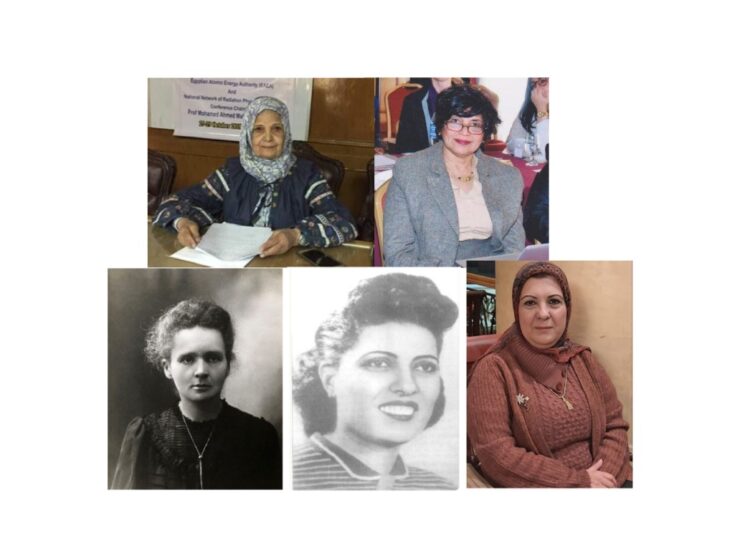By Hania Moheeb
Women’s footprint in the nuclear energy field was put as early as 1895 when Marie Curie together with her husband discovered the elements of Polonium and Radium. Curie was the first woman to win the Nobel Prize and the only person to get it twice – in Physics and in Chemistry – and the first woman to get the title of “professor” at the university of Paris. The International Atomic Energy Agency (IAEA) has launched a Fellowship Programme named after this brave scientist that helps increase the number of women working in the nuclear field and supports an inclusive workforce of both men and women who contribute to and drive global scientific and technological innovation.
But it is nothing short of startling however, to know that during the early 20th century, and long before the establishment of the Egyptian Atomic Energy Authority, there was a phenomenal Egyptian nuclear physicist called Sameera Moussa. The young scientist who was born in Gharbia Governorate in 1917 was not as lucky as Curie, but she was chasing her dream to make a difference in the lives of Egyptians employing science in day-to-day life and studying in the US to fulfill it, when she tragically lost her life in a car crash in 1952.
Though Egypt lost Moussa, the Egyptian Atomic Energy Authority was established few years later, in 1955 and the legacy carried on. The Authority saw three women chairs since its establishment: Dr. Fayza Abdel-Meguid, Dr. Leila Fikry and Dr. Tomader El Halfawy. Currently there are other women researchers in leading positions at EAEA; Dr. Ghada Ibrahim Eissa who is the chairperson of the Nuclear Research Center and Dr. Sahar Ismael, chairperson of the Radiation Technology Research Center.
Moreover, women still represent a big percentage of those who work in the field of Atomic Energy. As announced in 2021, women working in various jobs in the field of nuclear energy is estimated at 45%.
At the 15th Arab Conference on The Peaceful Uses of Atomic Energy, held last December, Dr. Sohair Qorraa, Professor at National Center for Radiation Technology said that 30% of the Arab nuclear energy research is attributed to female researchers.
According to the IAEA website, women make up less than a quarter of the workforce in the nuclear sector worldwide, which affects not only diversity within the industry, but also competitiveness. Many organizations, including the IAEA, make efforts to increase the share of women in all job categories.
It is similarly surprising to know that even in the US women make up less than 20% of the nuclear workforce, according to the Office of Nuclear Energy (ONE) website. “This is a stat that needs to change if the industry wants to continue to grow as new technologies move to market over the next decade,” the ONE article says.
A bright example of a global tech company supporting women’s progress in nuclear field is Rosatom Corporation, which has been implementing the Egyptian El Dabaa NPP project since 2015. Over a third (32%) of the company’s employees are women, which is 1.5-fold more than the global average of 22%. The company has launched the Women in Nuclear Industry Programme, involving about 1,000 women. Together with the Organization for Economic Cooperation and Development, Rosatom organises educational sessions for women holding senior positions. The company seeks to attract women to work not only in nuclear professions, but also in professions related to science, technology, engineering and mathematics in general.
The facts about Egyptian women working in this field may depict a rosy image about their lives. However, these women face challenges that are no different from the challenges other Egyptian working women and mothers are facing: like finding nurseries for their babies near their workplace for instance. This is in addition to dispelling the myth about the impact of radiation and the uses of nuclear energy in general. It has been imperative as a policy in Egypt to reach a full gender equality status, and the country is superseding in this crucial matter, but, still, there is a lot to be achieved, and worked on. Further development of Egypt’s civil nuclear programme as well as raising public awareness about nuclear energy and its role in the country’s economic and social progress can contribute to addressing those challenges women who chose a career in the nuclear industry have been facing.
Dr. Marwa Mohamed, Nuclear researcher and engineer at EAEA said “This field is not easy and you always have to be updated in every way you can and like Stephanie Kwolek said “All sorts of things can happen when you’re open to new ideas” which is what women are doing all the time, limits does not exist in science and learning. One of my dearest professors I learnt a lot from is Dr. Esmet Amin Professor of Nuclear Reactor Safety in ENRRA; she is always open for any question, also she is a living example of how successful women can be in such field with a target which has been achieved”.






Discussion about this post